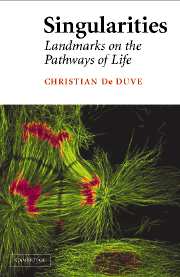Book contents
- Frontmatter
- Contents
- Foreword
- On Christian de Duve: An Editor's Appreciation
- General Introduction
- 1 Building Blocks
- 2 Homochirality
- 3 Protometabolism
- 4 ATP
- 5 Electrons and Protons
- 6 Thioesters
- 7 RNA
- 8 Proteins
- 9 DNA
- 10 Membranes
- 11 Protonmotive Force
- 12 Protometabolism Revisited
- 13 The LUCA
- 14 The First Fork
- 15 Eukaryotes
- 16 Oxygen
- 17 Endosymbionts
- 18 Multicellulars
- 19 Homo
- 20 Evolution
- Final Comments
- Bibliography
- Index
18 - Multicellulars
Published online by Cambridge University Press: 18 January 2010
- Frontmatter
- Contents
- Foreword
- On Christian de Duve: An Editor's Appreciation
- General Introduction
- 1 Building Blocks
- 2 Homochirality
- 3 Protometabolism
- 4 ATP
- 5 Electrons and Protons
- 6 Thioesters
- 7 RNA
- 8 Proteins
- 9 DNA
- 10 Membranes
- 11 Protonmotive Force
- 12 Protometabolism Revisited
- 13 The LUCA
- 14 The First Fork
- 15 Eukaryotes
- 16 Oxygen
- 17 Endosymbionts
- 18 Multicellulars
- 19 Homo
- 20 Evolution
- Final Comments
- Bibliography
- Index
Summary
The history of multicellular organisms represents the latest and, thanks to the fossil record, best-known stage in the long saga of life on Earth. It has been the subject of many learned treatises and discussions, which can profitably be consulted by any reader interested in the details. My purpose, in this chapter, is to focus solely on my chosen topic, namely, that of singularities, an aspect that, surprisingly, has attracted relatively little attention from the experts. Yet, singularities are a prominent feature of the trails that have led to present-day multicellular organisms. As far as is known, all land plants, all fungi, and all animals are derived each from a single common ancestor. Each new major group that appeared later in the evolution of life seems to go back to a single stem organism.
The Founders
Exactly when eukaryotic cells first formed multicellular associations remains uncertain, largely because many such associations may have existed without leaving any recognizable fossil trace. It seems likely, however, that single-celled protists thrived and evolved on Earth for as long as several hundred million years before giving rise to the multicellular organisms whose descendants surround us today. Why did it take so long?
A plausible answer to this question is that we are not dealing here with associations as generally understood, that is, entities composed of two or more genetically different cell populations that came together under the pressure of natural selection and are held together by the mutual benefits they derive from joining forces.
- Type
- Chapter
- Information
- SingularitiesLandmarks on the Pathways of Life, pp. 214 - 220Publisher: Cambridge University PressPrint publication year: 2005



